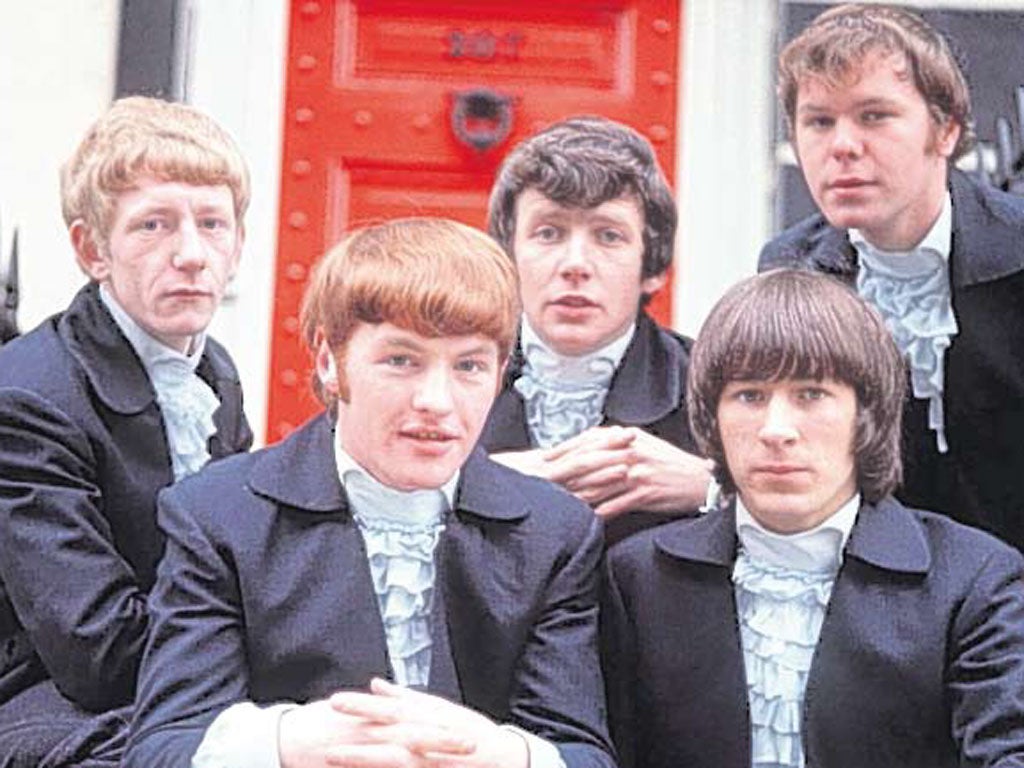George Gallacher: Frontman with Sixties band The Poets

With the vocalist and songwriter George Gallacher at the helm, The Poets were the first Scottish group to make the British charts, reaching No 31 with their wistful and ahead-of-its-time composition "Now We're Thru" in October 1964.
Their debut 45 for Decca was produced by the Rolling Stones impresario Andrew Loog Oldham, whose Immediate label they later joined. Yet, despite releasing some of the most innovative singles of the period, they never achieved the success of contemporaries like the Pretty Things, with whom they toured, but are fondly remembered by freakbeat and psychedelia connoisseurs the world over.
Born in Glasgow in 1943, Gallacher was a promising footballer and had trials with Leicester City and Celtic. By 1962, music had taken precedence and he formed The Poets with bassist John Dawson, drummer Alan Weir, rhythm guitarist Tony Myles and Hume Paton, whose 12-string guitar helped the band stand out as much as the Edwardian look – velvet jackets, ruffled shirts – they adopted before The Kinks, ostensibly as a nod to Robert Burns. Within a couple of years, their repertoire of rhythm and blues covers and original material by Gallacher and Paton won them a strong following in the ballrooms of central Scotland and North-east England, even if a London audition with Mickie Most proved unsuccessful.
Oldham, who had travelled to Scotland to marry the 18-year-old painter Sheila Klein, spotted The Poets on the cover of the magazine Beat News and tracked them down. "It was a Sunday morning," Gallacher recalled. "I was still in bed and my mother came in and said: 'George, were you expecting the manager of the Rolling Stones?'"
To promote "Now We're Thru", The Poets appeared on Top Of The Pops and Ready Steady Go! and were filmed for the US programme Shindig!, which explains their enduring cult status on the other side of the Atlantic. Impressed by Gallacher's ability, Oldham asked the singer to give Stones guitarist Keith Richards a few songwriting tips, but this only lasted one session. After producing their next three self-penned singles, the Zombies-like "That's The Way It's Got To Be", the haunting "I Am So Blue" and the dreamy "Call Again", Oldham became increasingly wrapped up in Stones business and setting up Immediate, and didn't spend enough time nurturing The Poets, causing dissension within their ranks.
When Paul Raven – at Immediate years before his reinvention as Gary Glitter – remixed their cover of the Motown standard and mod favourite "Baby Don't You Do It" in 1966 behind their back and lost the dynamism of the group's original mix, that proved the last straw for Gallacher.
The Poets declined an offer from the Four Seasons producer Bob Crewe to move to the US and retreated to Scotland, where the frontman showed his eventual replacement Andi Mulvey the ropes as he appeared alongside him for several gigs in a six-piece Poets. In 1967, Gallacher married and worked as a turner at Macdonald Pneumatic Tools in East Kilbride. He took up football again but was by then too old to consider a professional career.
In the late 1980s he returned to university and qualified as a teacher. He still played music with his brother-in-law Fraser Watson, another ex-member of The Poets, with whom he eventually relaunched the band last year with the help of Edinburgh's The Thanes. Gallacher suffered a heart attack on his way home after watching Partick Thistle beat Dumbarton 3-0 to go top of the Scottish First Division. Tony Myles is now the only surviving member of the original line-up of The Poets.
George Gallacher, singer, songwriter, turner and teacher: born Glasgow 21 October 1943; married 1967 Anne Watson (two sons); died Glasgow 25 August 2012.
Join our commenting forum
Join thought-provoking conversations, follow other Independent readers and see their replies
Comments